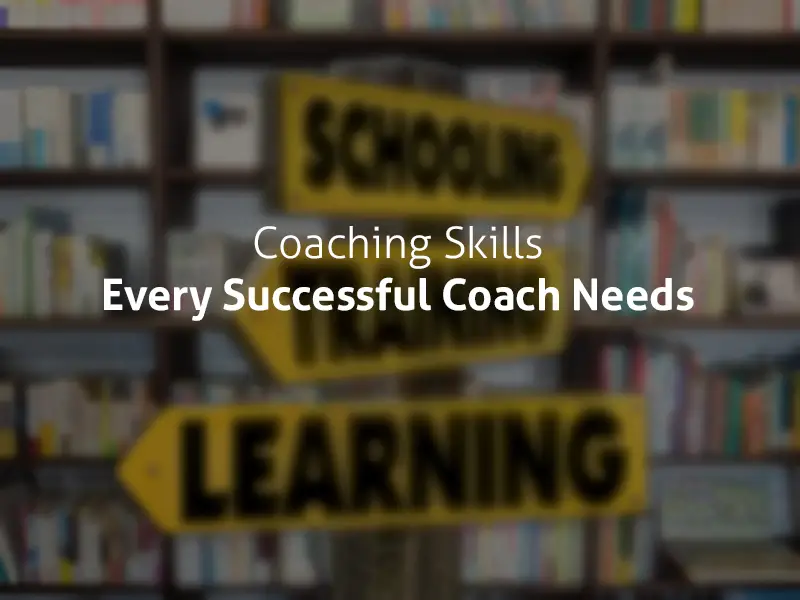We all know that a good coach can help you turn your life around, but none of stop to think about the skills that necessary for a coach to have. What kind of skills did they have to develop to serve and empower another person in this manner? Are these skills easy to develop, do you have them?
If you are a life coach and you spend your days helping people live their best lives, you know for a fact that there is always room for improvement. Do you help yourself build the best self the way you help your clients? Today we talk about all the skills you have or could have in order to rise above the competition.
Take a stock of the qualities and abilities you do have and then update your skill set so that not only do you help more people, you can also give yourself an edge in the coaching industry.
Who is a coach?

A coach can be a person who fits multiple roles in your life to help you live the best version of your life. To do this, they can be your friend, your confidant, your guide, your teacher, your personal cheerleader, your guru.
A coach can help you make your life better by approaching the progress plan through different niches of life. They help you set goals and achieve them in order to considerably improve your life in multiple areas.
Most people who are feeling stuck or unfulfilled in their lives have several things in common: they have never felt heard or they feel like they can’t do justice to their dreams. A coach can do wonders for a person’s ability to have tools to make future plans and then achieve them.
If you have helped your friends feel heard and have given them advice that has helped them improve their lives, you have given them a boost that has helped them take control of their lives. This is an example of life coaching in regular life.
What does a coach do?

A coach can help you make future plans to improve the quality of your life, and then they can help you achieve your goals by maintaining a feedback loop and keeping you honest. This can be done in many areas of your life.
A fitness coach can help you improve your fitness and also get you into a healthier shape. A confidence coach can help you develop self-confidence and thus live a life in which you have a bigger presence.
Different coaches do different things, but all the coaches have one thing in common: they are all life coaches. That means that in their own way, they all help you improve your life in some way. They might use different tools or strategies to do it, but they’ll help you become a much better version of yourself.
What is the difference between a coach and a therapist?
Now, based on how I have been describing coaches, you might be tempted to confuse them with therapists, but no, they are not the same professions at all. The only things they have in common is the improved measure of control their clients report to have over their lives after getting help.
These professions address your life and your progress entirely differently, and we will benefit from knowing how.
The key difference in the clientele these professions help is very evident from the start. A life coach cannot help you if you are not focused on improving your life. They cannot help you with your past pain or trauma, and cannot help you deal with emotional scars. A therapist takes who you are and does their best to get you enough help so they can help you fix your issues in the past and behaviour patterns.
As you can see in the graphic above, a therapist’s role can be very reactive, they help you deal with the how people react to your actions. A coach, on the other hand, will help you make strategies for the future and help you improve your own behaviour patterns to improve the way other people react to you.
A person should never confuse the roles of these two professions, and if you think your client needs the help of a therapist before they are ready to proactively improve their life with your assistance, make sure to tell them the same. A coach’s help is only useful if the client is determined to change their lives and has the emotional and mental stability to do so.
If you want to learn more about how to grow your coaching business by learning the right coaching techniques, build a six figure coaching business and learn how to get better results for clients in less than half the time, come join my free webinar here!
What type of skills does a coach have/should have?
While most of the coaching skills we’ll point out in this article are very obvious, there are few that people don’t necessarily associate with the role of a coach. All these skills are key to the coaching industry and having most of them would set you apart from the herd.
You might think that the experience and ease with which you helped your friend with her problem successfully all those time, those skills would be easily scalable to your coaching role, but each client is different. You happened to already have a bond of trust and rapport with your friend.
To successfully help your clients, you would have to emulate the same bond with your clients that lets them feel safe under your guidance.
Now that you know the basic things about the role of a coach, here are a few key skills that a coach should have in order to meaningfully help their clients. A good should be able to:
- Listen: the most important thing you can do for your client sometimes is to make them feel heard. If you listen well to your client and make them feel like you as a person understands how they feel, they are much more liable to trust to with their life’s burdens and their struggles. This is a crucial element of being in the coaching industry because helping people is very much dependent upon knowing how that person needs to be helped.
- Give meaningful feedback: No matter what niche of coaching you are focusing your career in, the skill of giving meaningful feedback is going to be essential to your life’s work. Keeping your clients accountable depends on how well your feedback providing skills are. Both your negative and positive feedback needs to be effective and well-timed in order to make the most impact on the client’s growth.
- Hold clients accountable: In order to help people grow, you as a coach will have to call people’s negative behaviour patterns out. If you can’t help your client be accountable for their actions, you will not be effective as a coach.
- Observe: If you have been listening effectively to your client, you can start to observe deep-rooted causes that give rise to the obstacle that your client faces. If you have done that correctly, you will be able to provide a much more effective guidance to your client.
- Analyse: As a coach, you need to not only observe your client’s actions, behaviour, and needs; you also need to be able to analyse what that means in terms of your plans for that client.
- Communicate: No matter who your client is, you need to have the necessary tools to properly communicate with them so that you can confidently guide them. With miscommunication, you can derail a lot of progress and thus hinder the growth of your client.
- Time things well: Your advice and your guidance will only ever be effective if you’ve timed it well depending on the person. Depending on your client’s progress and their growth, you also need to modify your plans in a timely manner.
- Assimilate: Make sure to compile all the available information in the best manner so you can analyse the needs of your client well.
- Organize: This one is for your own productivity. If you are not organized, you will not be able to keep all things well within your reach. Make sure to organize your client’s information and their growth plans well so you can access it easily when you need it. If you have to flounder around for the information when it’s time, you’ll not be effective.
- Empathise: Empathy is perhaps one of the most important skills needed for being a coach. If you can’t be empathetic towards your client, your client will not be able to trust you. Without that bond of trust and understanding, you will not get all the information needed for a client.
After all, who wants to tell an uncompassionate or uninterested person about their biggest struggles and failings? Remember, you are there to help them. If you can’t empathize, you are in the wrong industry.
- Maintain an ethical code of conduct: In this industry, you will be entrusted with the deepest secrets and emotional vulnerabilities of your clients. It is your duty to keep all your client’s information confidential.
- Compliment: As a coach, you’ll sometimes need to be the personal cheerleaders for your clients. Give positive feedback for actions and behaviour patterns that deserve it, so as to build the confidence in your client. Giving feedback is necessary, but so is celebrating every small success your client will have. This will motivate them to do better by the power of positive reinforcement.
- Motivate: As we said earlier, motivating your clients is an important part of your job. If you give them enough motivation, they’ll try harder to follow the path you have helped the setup, and hence, make your program a bigger success.
- Empower: If you, the coach, can give enough support to your client, you will be able to empower them to not only have more control over their lives but also help them overcome their obstacles.
- Apply their intuition: Sometimes the best plan of action isn’t the one that has traditionally worked in the same situations. Every person is unique and so are their struggles. As you get more experience, you’ll start to get a better sense of how to help your clients best. Trust your instincts and follow them.
- Be energetic: Most people who feel defeated by life can also feel lack of motivation, energy, or will to change things. Your energy can be the driving force that can help people change their lives. If you have high levels of energy, it could be contagious in the best meaning of the word.
- Have positivity: If you have a negative attitude, tone, or approach towards anything in this industry, you will not be able to help anybody. A lot can be done solely on basis of positivity. You have to become an example of your way of doing things. If you expect your clients to be positive, you first have to be positive yourself.
- Be creative: There is the very little transitive process involved in this industry. There are no rules and no strict laws that govern how a person will be able to feel better. Rather than being an exact science, this field is more a creative format that lets you ideate how to do it in the best manner. Go ahead, be creative. You never know what might work.
- Be interested: As cheesy as it is, you have to genuinely be interested in the needs, failings, successes, growth, achievements, and troubles of your client. If you are disinterested, it will be apparent no matter how well you think you have faked it.
- Be confident: Again, this is a case of ‘do as I do’. If you are confident enough, it will translate into the way your clients see their own success. Also, you will have to be able to devote large areas of your life to other people in this role. If you are not confident, you will not able to focus on them and would be tempted to make the conversation about yourself. That is harmful in this line of work.
- Be knowledgeable: Try to keep acquiring new skills in your line of work. The more you know, the more you’ll be able to offer your clients. Being an expert is never a bad thing.
Frequently Asked Questions (FAQs)
Who Is A Coach?
A coach is someone who provides services to help individuals or organizations improve performance. This can be a one-time event, a series of meetings, or an ongoing relationship.
What Does A Coach Do?
A coach is a person who guides and directs you towards achieving your goals. To be more precise, a coach is a mentor. And what a mentor does is help her mentee grow as an individual so that he/she becomes more confident and independent. A good coach will also help you choose the right path for yourself and tell you when you are heading the wrong way. That’s why most of the time a coach is someone who has been there and done that. A good coach knows the tricks of the trade and will help you find a path that works for you.
What Is The Difference Between A Coach And A Therapist?
The first difference between a coach and a therapist is that a coach mainly focuses on the exterior, while a therapist focuses on the interior. A coach’s goal is to help us become better in our jobs, in our relationships, and our physical health. A therapist focuses on helping us see and heal the patterns that cause our suffering. A coach works best when you’re stuck in a rut or are looking to make some positive change in your life. A therapist works best when you feel depressed, anxious, or dissatisfied with your life, and need deeper insight into the source of your pain.
How to improve coaching skills?
To get better at coaching or improving coaching skills, you need to learn about it by reading about coaching and psychology and by doing it often. Read books on the subject and listen to audio programs. To get experience, volunteer to coach in sports, become a coach for a youth group, or coach people in your community center.










Thanks for the well written post!